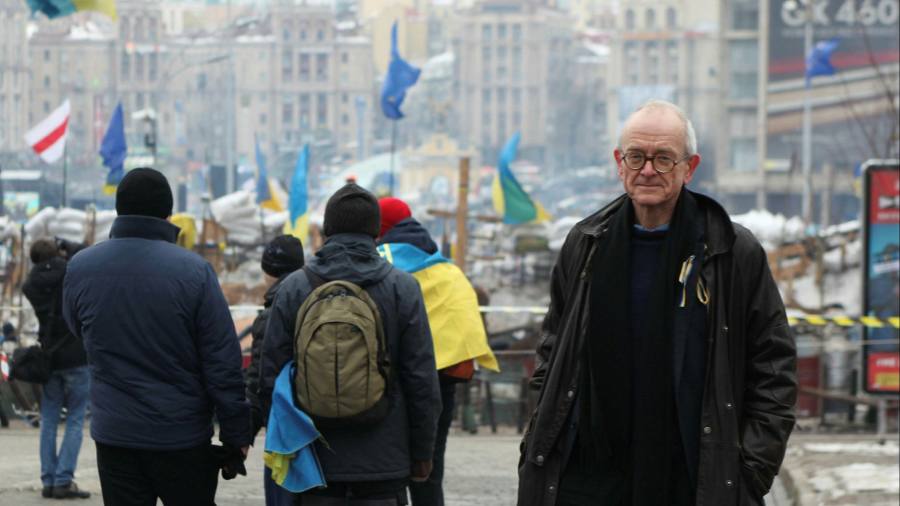Henry Marsh: a doctor’s view of the war in Ukraine

Thirty years ago, almost to the day, I first went to Kyiv. Until Covid, I continued to go there regularly, and Ukraine became my second home. With the pandemic easing, I had planned to return this month. So I know Ukraine – especially Kyiv and Lviv – very well, and to see so many familiar places become war zones is both strange and horrifying.
Texting or talking on the phone to my many friends there every day is very upsetting – I feel guilty about the contrast between my situation and theirs, and despair about what might happen to them. The euphoria about the slow and botched initial Russian attack has worn off, and I wonder for how much longer I will remain in contact with my friends, or even whether I will ever see them again. As I write, Ukrainian cities are being bombarded by the Russians, with mass civilian casualties, and this will probably soon be taking place in Kyiv.
I first went to Ukraine almost by chance – I was invited to deliver some lectures in Kyiv, where there was a major neurosurgical hospital. It so happened I had studied Russian and Soviet history at Oxford university before, changing tack, I trained as a doctor and became a neurosurgeon. But despite what I had learned about the Soviet Union, I was staggered by the conditions I found in the hospitals in Kyiv in 1992 – huge, bleak concrete buildings with scarcely any of the resources we take for granted in the west. I met a young neurosurgeon who was keen to learn from me, and I worked with him for many years, driving from London to Kyiv more than once with second-hand medical equipment.
There has been a purely technical and clinical side to the medical work I have been involved with in Ukraine but, more important, I have tried to encourage what I suppose you might call more liberal attitudes in Ukrainian medicine. All healthcare systems reflect the societies they serve. This is why our own much-revered NHS is so wildly variable in its quality – it reflects the deep economic and social inequalities in British society. The Soviet Union was autocratic and monolithic, and Ukrainian healthcare 30 years ago was the same. Soviet society, it was said, involved cringing servility to those above you and abuse of those below you. This is still alive and well in Russia, as we saw in the recent scenes in the gilded halls of the Kremlin.
Ukrainian medicine, as I first found it, was “eminence-based” and not “evidence-based”. Professors ruled the roost, would brook no criticism, and were only interested in training their own sons. In recent years I have been working with young doctors, who have not been shaped by the Soviet past. They are not dogmatic, they are better at working together, they understand the importance of evidence, and also of kindness to patients. Conditions in many hospitals have changed beyond recognition.
All of this reflects profound changes in Ukrainian society as a whole. It is, after a shaky start, a democracy with a rapidly growing economy – still bedevilled by corruption and oligarchy, but with a free press and potentially a great future ahead of it. More and more people in Ukraine identify with Europe and not with Russia. Ukrainian freedom is a dreadful threat to Putin and his kleptocratic cronies – what would happen to them if these changes took place in Russia? This is what the war is really about, although Putin justifies it in terms of making Russia great again.
Henry Marsh (right) with an operating microscope he drove from London to Kyiv
The present crisis cannot be understood without some reference to Ukrainian history, which is complicated. There are analogies with British history – the painful history of relations between England and Ireland. Russians have often looked down on Ukrainians with imperial condescension and a feeling of ownership, just as many English did of the Irish.
What most Ukrainians have in common is that they are historically underdogs – to the Poles, to the Austro-Hungarians, to the Russians. I have found working with them, on the whole, easy.
My colleagues in Kyiv are unable to contact their colleagues in Kharkiv or in Mariupol – the latter city the site of an appalling Russian air strike on a maternity hospital this week. At the time of writing hospitals in the capital were quiet, although having to conduct much of their work in basements. The Russians will almost certainly bombard Kyiv before trying to enter it, and mass casualties will result.
Like all of us, I feel helpless as I witness the terrible crime of Putin’s invasion. I am also deeply ashamed by my own government mean-minded and clumsy response to the refugee crisis. I have at least been able to help a little by working with the extraordinary David Nott, probably the world’s leading expert on war zone surgery. Nott and his foundation have prepared an online course for our Ukrainian colleagues, showing them how to deal with the horrendous injuries that modern munitions cause.
I do not know how this war will end. But what is certain is that there is much more suffering to come – the Ukrainians will never give in – and the need to help Ukraine will become even greater.
Henry Marsh’s book ‘And Finally’ will be published by Jonathan Cape in September
Voices of Ukraine

Read more personal accounts of the war in Ukraine:
Writer Julia Julia on leaving behind her old life in besieged Kharkiv
Writer Oleksandr Mykhed on the language of war
Kyiv diary from journalist Kristina Berdynskykh, who asks: ‘Was I right not to leave?’
Novelist Haska Shyyan on telling her daughter about the war
Follow @ftweekend on Twitter to find out about our latest stories first



